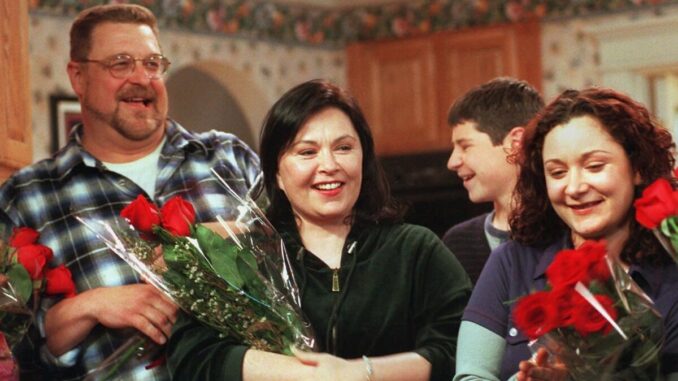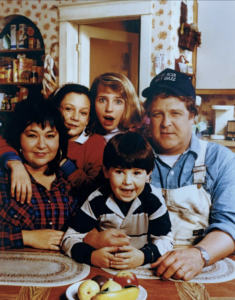
The first thing to say about the ninth season of Roseanne is that it is a mess. Strange, scattered, and self-conscious, the last season of the show is a fundamentally different thing than the eight seasons that preceded it. And because the new Roseanne series is designed as a continuation of the original, season nine hangs around the show’s neck like the proverbial albatross. That albatross, in this case, is a strange retroactive dream sequence season involving death and trips to the Hamptons and at least one scene where Debbie Reynolds play-fights with a lightsaber.

So what is the new Roseanne going to do with that? What should we do with it?
The answer for the new Roseanne is most likely to try as hard as possible to ignore everything about season nine, because it’s a season of TV that actively works to undo every distinctive thing about the identity of the show up until that point. After years of working in uncertain, unstable blue-collar jobs, the Conner family literally wins the lottery. Immediately, a show that’s been about financial stress and the importance of family jettisons the thing that has most defined it from the start. The lottery win doesn’t happen at the end of the show, where it could’ve acted as a strange but conclusive deus ex millions. It happens at the beginning of season nine, forcing the entire final season to become a fundamentally new show, separate from everything that happened before.
The lottery win isn’t the only change, either – at the end of season eight, Roseanne’s husband Dan has a heart attack and nearly dies, and then Roseanne leaves him when he comes home and quickly ignores the new diet meant to keep him alive. Most of season nine happens without Dan. He’s off in California caring for his mother, and then Roseanne discovers he’s been cheating on her, and then they reconcile but he’s still not around much.
Instead of the familiar debates about working-class life, or the core focus on the Conner’s marriage, season nine of Roseanne occupies its time with intense, scattered, self-conscious self-reflection. Much of it is preoccupied with television and the process of making television, including parodies of other TV shows (I Dream of Jeannie, The Honeymooners, and The Mary Tyler Moore Show). There’s an episode where the Conners ride a train to D.C. and Roseanne transforms into a Rambo figure in order to take down the terrorist hijackers. Steven Seagal shows up at the end. Late in the season, network executives arrive at Roseanne’s house to try to buy her life rights for TV development; most of the episode is about Roseanne’s frustration that the major networks want to sanitize her life and cable channel execs want to add as much nudity and sex as possible. I’m not even sure those are the strangest episodes, either — that honor might belong to the AbFab crossover Halloween episode, where Roseanne and Jackie attend a fancy NYC party and make friends with Patsy and Edina, who turn out to be members of a Satanic cult.

In the final episode of the series, we find Roseanne sitting in her basement, working on the memoir she’s been trying to write for so long. She narrates the last pages as a voice-over while we watch her sitting at her desk, writing and considering. Then the other shoe drops. Or it’s supposed to be the other shoe, but it feels more like an attempt to perform a narrative version of that memory-erasing flash pen from Men in Black. Dan did not actually recover from his heart attack, Roseanne tells us. He died, and Roseanne was so devastated that she lost months to imagining an alternate version of their life, one where Dan lived and they won the lottery and all kinds of odd things happened. It’s a St. Elsewhere ending, a retroactive declaration that all the bad stuff was a dream. The finale of the show is about Roseanne and Roseanne trying to erase as much of that last season as it can.
This puts the revival in an awkward, essentially impossible, but ultimately freeing place: It gets to ignore the parts of Roseanne’s ending that it doesn’t want to keep (Dan’s death), and keep the parts that it likes (the erasure of the entire ninth season). Except for a few family details like the birth of Becky’s daughter, Harris, the new series is really a revival of Roseanne season eight. Like the finale itself, the revival is another way to erase everything about season nine.
The temptation is to do exactly what Roseanne seems to be hoping we do: forget the whole thing ever happened, and pretend the original show ended right before the moment Dan had a heart attack. From a strict narrative logic standpoint, this is fairly bonkers — we have to keep the whole “the lottery was just a dream” thing, while also ignoring “Dan was dead the whole time.” From the perspective of network TV storytelling, though, it makes much more sense. For most sitcoms in the age of the original Roseanne, every episode is its own miniature stand-alone experiment, and the identity of a series is more about an identifiable status quo rather than any one particular plot development. The revival of Roseanne picks up from an imagined platonic ideal of the end of the last Roseanne, which doesn’t have to have any particular relationship to what actually happened.

But if we ignore season nine of the original series, we discard one of the most transparently self-conscious, candid seasons of television ever made, and with it, a road map to some of Roseanne and Roseanne’s most naked obsessions. Season nine of Roseanne is like a homunculus of Roseanne Barr’s fears and aspirations. It’s a season of TV about what happens when you suddenly have wealth, how to live outside a marriage that’s fallen apart, the strangeness of fad dieting and judgmental luxury spas, and most of all, what it’s like to have your actual self get flattened into and limited by a hugely popular fictional version of yourself. It’s a portrait of someone on TV who is deeply conflicted about the culture of being on TV, while also frantically trying to stay on TV.
If you ignore season nine, you also ignore a locus for one of the central questions of the Roseanne revival. How much of what you’re seeing is Roseanne Barr (whose pro-Trump, deliberately provocative stances have taken over her image), and how much is Roseanne Conner? Barr isn’t the showrunner, and she’s not on the writing staff, but the tension between the two figures feels inevitable. And if you ignore the Roseanne of season nine, you also miss the version of her who literally scolds television executives for misrepresenting her story, the woman who delivers jeremiads against Hollywood and who cheerfully thumbs her nose at the history of women on television.

I admit there’s another reason I’m loath to just throw out the ninth season of Roseanne, in spite of the fact that it is, by pretty much any measure, a bad, bad season of TV. It’s to do with the way it was bad, the weird, gutsy, just-throw-stuff-at-the-wall openness of it, like an improv sketch that took “yes, and…” way too far. Yes! They win the lottery and … Roseanne’s mom comes out at Thanksgiving and Jackie dates a prince and Roseanne summers with some WASPs and, yes, the Rambo train hijacking situation. It’s a sort of TV we’re moving farther and farther away from, a sort of TV that the current emphasis on seriality, completion, totality, and coherence would never allow to happen.
Maybe — probably — that’s a good thing. But there’s something thrilling about firing up a season nine episode of Roseanne and having your hair blown back in surprise and horrified shock. It’s a kind of experimentation I wish fictional TV now did more of, and did with the same devil-may-care joy that Roseanne often approached its oddball ideas. So while I do not resent the Roseanne revival’s choice to disregard almost all of that final season, there’s a part of me that hopes some tiny bit of its careless bravado remains.
